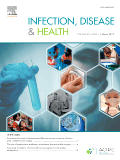
Infection Disease & Health
Scope & Guideline
Elevating Health Strategies through Rigorous Scholarship
Introduction
Aims and Scopes
- Infection Prevention and Control:
The journal explores methodologies and practices aimed at preventing infections in healthcare settings, including the effectiveness of personal protective equipment (PPE), cleaning protocols, and surveillance strategies. - Antimicrobial Resistance:
Research on the emergence and management of antimicrobial resistance is a core focus, examining the impact of antibiotic use and infection control measures on resistant organisms. - Public Health and Epidemiology:
The journal publishes studies that assess the epidemiology of infectious diseases, including outbreak investigations and the effectiveness of vaccination programs and public health interventions. - Healthcare Worker Safety:
A significant area of research includes the experiences and safety of healthcare workers, particularly regarding their exposure to infectious diseases and the adequacy of protective measures. - Patient Care and Outcomes:
The journal emphasizes studies that evaluate patient outcomes related to infection control practices, including surgical site infections and hospital-acquired infections. - Qualitative Research in Infection Control:
Qualitative studies that explore the experiences and perceptions of healthcare professionals regarding infection prevention and control measures are also a prominent feature.
Trending and Emerging
- COVID-19 Management and Research:
There is a significant increase in research focused on COVID-19, including studies on transmission prevention, vaccine effectiveness, and healthcare worker safety during the pandemic. - Technology in Infection Prevention:
Emerging themes include the use of technology, such as automated monitoring systems and mobile health applications, to enhance infection control practices and healthcare delivery. - Mental Health and Wellbeing of Healthcare Workers:
Recent publications indicate a growing awareness of the mental health challenges faced by healthcare workers, particularly during the pandemic, leading to research on support systems and resilience. - Environmental Cleaning and Hygiene Practices:
Research focusing on the efficacy of environmental cleaning and disinfection practices has gained prominence, reflecting the need for robust hygiene protocols in healthcare settings. - Innovative Diagnostic Tools:
The development and evaluation of rapid diagnostic tests and their impact on infection control practices are emerging themes, highlighting the need for timely diagnosis in managing infectious diseases.
Declining or Waning
- Traditional Infection Control Techniques:
There seems to be a waning interest in traditional methods of infection control, such as basic hand hygiene practices, as more attention is directed towards innovative and technology-driven solutions. - General Antimicrobial Stewardship:
Although antimicrobial stewardship remains important, there is a noticeable decline in publications specifically addressing general practices, as the focus shifts to addressing specific resistant organisms and tailored interventions. - Non-COVID Infectious Diseases Studies:
With the overwhelming focus on COVID-19, research on other infectious diseases appears to have decreased, indicating a potential neglect of important non-COVID-related topics. - Healthcare Facility Design Innovations:
Research specifically on the design of healthcare facilities for infection control has become less frequent, as practitioners and researchers focus more on operational and procedural improvements. - Educational Interventions for Infection Control:
Although educational approaches remain relevant, there has been a decline in studies solely dedicated to educational interventions, as the emphasis has shifted towards practical implementation and outcomes.
Similar Journals

Surgical Infections
Fostering interdisciplinary dialogue on infection prevention.Surgical Infections, published by MARY ANN LIEBERT, INC, is an esteemed journal dedicated to advancing the understanding and management of infections associated with surgical procedures. With an ISSN of 1096-2964 and an E-ISSN of 1557-8674, this journal has emerged as a vital resource within the fields of Infectious Diseases, Surgery, and Microbiology. Over the years, it has established a notable presence, achieving a 2023 Q2 ranking in Infectious Diseases and Surgery, as well as a Q3 ranking in Microbiology. The journal holds an impressive position at 74th percentile in Surgery according to Scopus, making it a reliable platform for disseminating current research and clinical practices. Surgical Infections aims to provide an interdisciplinary forum for both seasoned professionals and academics, encouraging the exploration of novel therapeutic approaches, prevention strategies, and case studies that address the complexities of surgical-related infections. As the field continues to evolve, this journal remains committed to fostering innovative research that enhances clinical outcomes and patient safety.
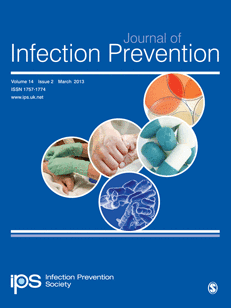
Journal of Infection Prevention
Exploring the forefront of infectious disease management.Journal of Infection Prevention, published by SAGE Publications Ltd, is a pivotal resource in the fields of nursing, public health, and infectious diseases. With an ISSN of 1757-1774 and an E-ISSN of 1757-1782, this journal primarily serves as a platform for disseminating innovative research and comprehensive reviews aimed at enhancing infection control practices and health policy formulation. As of 2023, it holds a prestigious position within category quartiles, ranking Q2 in Advanced and Specialized Nursing and Q3 in Health Policy, Infectious Diseases, as well as Public Health, Environmental and Occupational Health, underscoring its relevance and influence in these arenas. Researchers, practitioners, and students are encouraged to explore the journal's content to contribute to the advancement of infection prevention strategies and the overall improvement of healthcare systems. With a convergence timeline from 2009 to 2024, the Journal of Infection Prevention is committed to publishing high-quality articles that address current challenges in infection control, thus playing a crucial role in the ongoing dialogue among health professionals.
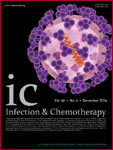
Infection and Chemotherapy
Exploring Innovations in Infectious Disease TreatmentInfection and Chemotherapy, an esteemed journal published by the Korean Society of Antimicrobial Therapy, focuses on the dynamic fields of infectious diseases and pharmacology. With an ISSN of 2093-2340 and an E-ISSN of 2092-6448, this peer-reviewed, open-access journal has been providing a crucial platform for research dissemination since 2008. Based in South Korea, it boasts a significant impact in the academic community, as evidenced by its Q2 ranking in both Infectious Diseases and Pharmacology categories for 2023. It holds a Scopus rank of 64 out of 272 in Pharmacology and 98 out of 344 in Infectious Diseases, showcasing its prominence and the quality of research it publishes. With a focus on advancing scientific knowledge, Infection and Chemotherapy is committed to fostering essential dialogues among researchers, clinicians, and students, making it a vital resource for those engaged in the fight against infectious diseases and the development of effective therapeutic protocols.

Infectious Diseases and Clinical Microbiology
Advancing knowledge in infectious diseases and microbiology.Infectious Diseases and Clinical Microbiology is a pivotal journal dedicated to advancing our understanding of infectious diseases through rigorous scientific research and clinical practices. Published by DOC DESIGN INFORMATICS CO LTD, this journal serves as a vital platform for researchers, healthcare professionals, and students keen on enhancing their knowledge of microbiological sciences and the clinical implications of infectious agents. With an ISSN of 2667-646X, it aims to disseminate significant findings in the field, enriching the scholarly dialogue surrounding infectious diseases. While currently operating under a traditional access model, the journal encourages global collaboration and knowledge sharing, striving to make a meaningful impact in tackling the challenges posed by infectious diseases. Its content aims to bridge the gap between laboratory research and clinical application, making it an essential resource in the contemporary landscape of global health.
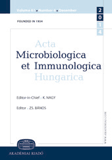
ACTA MICROBIOLOGICA ET IMMUNOLOGICA HUNGARICA
Unveiling the complexities of immune responses.ACTA MICROBIOLOGICA ET IMMUNOLOGICA HUNGARICA is a distinguished academic journal published by AKADEMIAI KIADO ZRT, focusing on significant advancements in the fields of microbiology, immunology, and infectious diseases. Established in 1994, this journal serves as a vital platform for researchers, professionals, and students keen on exploring the complexities of microbial interactions and immune responses. With a current Impact Factor reflecting its rank within the Q3 categories for Immunology, Microbiology, and Infectious Diseases, it retains a critical position in disseminating innovative research. Although not open access, the journal provides extensive insights disseminated through various academic databases, ensuring a broad reach within the scholarly community. Its convergence over three decades indicates a robust commitment to excellence in scientific inquiry and knowledge sharing. As it moves towards the future, ACTA MICROBIOLOGICA ET IMMUNOLOGICA HUNGARICA continues to uphold its legacy of fostering collaborative research initiatives that contribute to the understanding and treatment of microbial diseases globally.

Infectious Disease Reports
Empowering insights into the world of infectious diseases.Infectious Disease Reports is a premier open-access journal published by MDPI, dedicated to advancing the field of infectious diseases. Since its inception in 2009, this journal has established itself as a significant platform for disseminating cutting-edge research, reviews, and case studies, critical for global health. With a commendable Q2 ranking in the category of Infectious Diseases and a Scopus rank of #140 out of 344, it is recognized for its impactful contributions to medical research, holding a 59th percentile in its field. The journal aims to provide comprehensive insights into various dimensions of infectious diseases, ranging from epidemiology to novel treatment modalities. As an open-access publication, Infectious Disease Reports ensures that its articles are freely available to a wide audience, fostering collaborative efforts among researchers, healthcare professionals, and students worldwide. With its ongoing commitment to excellence, the journal plays an essential role in shaping the future of infectious disease research.

Emerging Microbes & Infections
Unlocking insights into emerging infections.Emerging Microbes & Infections is a premier open access journal, published by Taylor & Francis Ltd since 2012, dedicated to advancing the understanding of microbial infections and their implications in human health. With an impressive Q1 ranking across multiple categories—including Drug Discovery, Epidemiology, Immunology, and Infectious Diseases—this journal is at the forefront of research in the microbiological sciences. Covering a diverse range of topics, it serves as a vital resource for researchers, healthcare professionals, and students alike. The journal's commitment to open access ensures worldwide dissemination of cutting-edge findings, fostering collaboration and innovation in tackling challenges posed by emerging infections. As part of the thriving academic community in the United Kingdom, Emerging Microbes & Infections plays a crucial role in shaping the future of infectious disease research and public health.
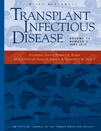
Transplant Infectious Disease
Elevating the discourse on transplant medicine and its infectious challenges.Transplant Infectious Disease is a premier journal dedicated to advancing the understanding of infectious complications in transplant recipients, contributing significantly to the fields of Infectious Diseases and Transplantation. Published by Wiley in the United Kingdom, this journal boasts an impressive reputation within the academic community, holding a 2023 Q2 quartile ranking in both Infectious Diseases and Transplantation, as well as notable Scopus rankings that position it among the top tiers of its categories. With a convergence of scholarly articles and research findings from 1999 through 2024, Transplant Infectious Disease serves as a critical resource for researchers, professionals, and students seeking to explore the intersection of transplantation and infectious diseases. The journal encourages open dialogue and knowledge dissemination through rigorous peer-reviewed content, making it an essential platform for those aiming to address the challenges and innovations in transplant medicine.
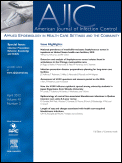
AMERICAN JOURNAL OF INFECTION CONTROL
Empowering health professionals to combat infectious diseases.The American Journal of Infection Control is a leading peer-reviewed publication dedicated to advancing the field of infection prevention and control. Published by Mosby-Elsevier, this journal has been a crucial resource since its inception in 1980, focusing on the intersection of infectious diseases, public health, and health policy. As of 2023, it holds an impressive Q1 ranking in both Health Policy and Public Health, Environmental and Occupational Health, while also achieving Q2 rankings in Epidemiology and Infectious Diseases. With an increasing impact factor and a strong reputation reflected in its Scopus rankings, the journal appeals to researchers, health professionals, and students committed to preventing the spread of infections and enhancing healthcare safety. Although it does not currently offer Open Access, the journal ensures broad dissemination of its vital research through various subscription options. By fostering interdisciplinary collaboration and evidence-based practices, the American Journal of Infection Control plays a pivotal role in shaping effective infection control policies and practices worldwide.

Journal of Infection and Public Health
Driving Change Through Evidence-Based Public Health StudiesJournal of Infection and Public Health is a premier open-access journal published by ELSEVIER SCIENCE LONDON, dedicated to advancing knowledge in the fields of infectious diseases, public health, and environmental health. Since its inception in 2008, this esteemed journal has become a cornerstone of research dissemination, especially after transitioning to an open-access model in 2017, allowing wider accessibility to groundbreaking studies. With an impressive impact factor and ranking in the Q1 category for Infectious Diseases and Public Health as of 2023, the journal stands at the forefront of scientific inquiry, boasting a Scopus rank of #22 out of 665 in Public Health, underscoring its influence and reach in the academic community. Researchers, professionals, and students alike will find the journal's rich repository of peer-reviewed articles invaluable for ongoing education and practice in a rapidly evolving field. For contributing to the global understanding of health dynamics, Journal of Infection and Public Health is a vital resource, inviting scholars to explore, engage, and contribute to the crucial discussions shaping our world.